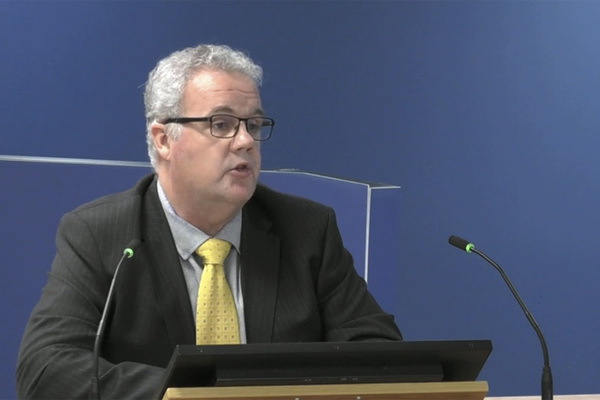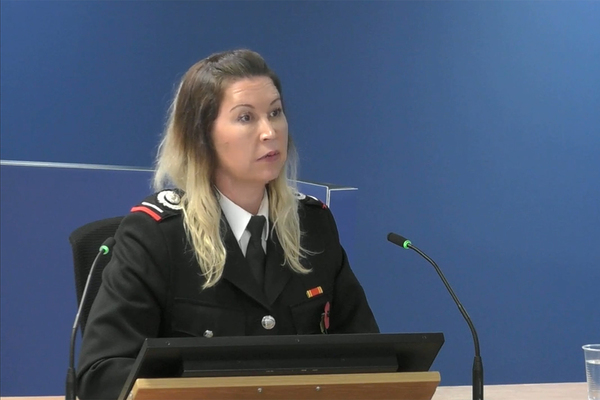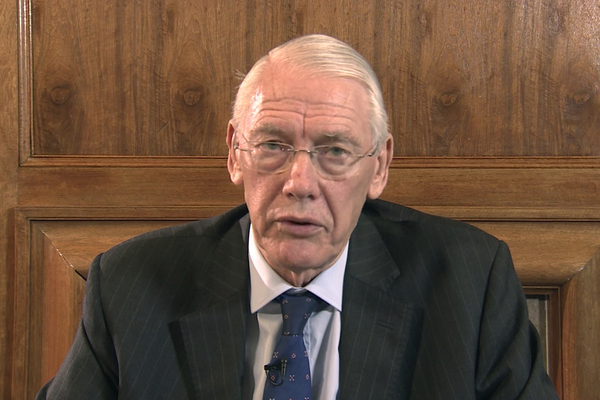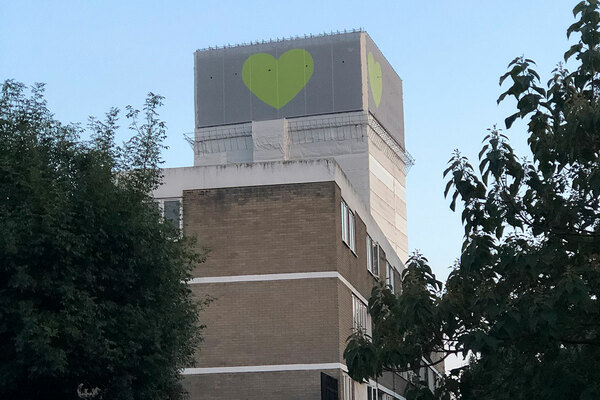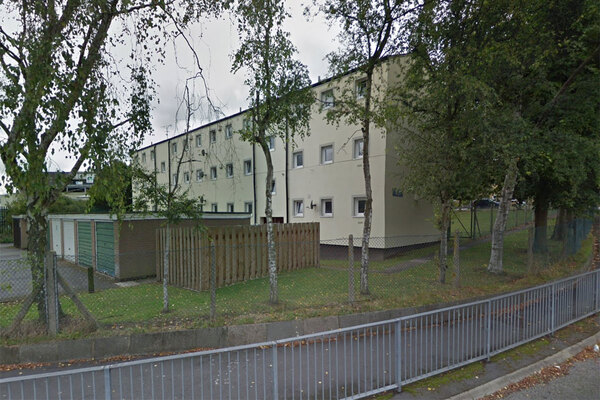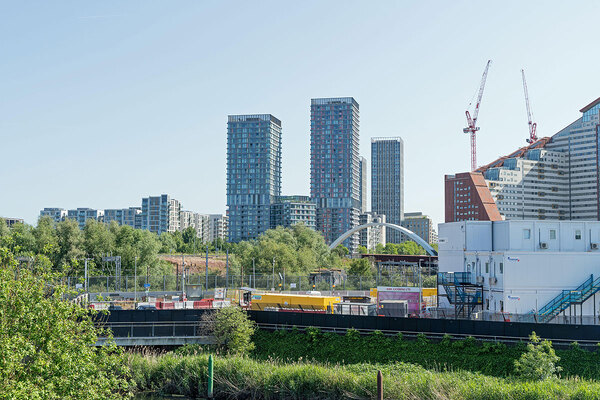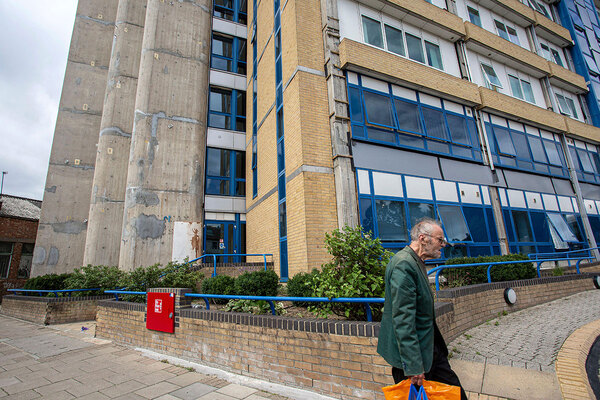Grenfell Tower Inquiry diary week 55: ‘My review is pretty scathing!’
In a week that included the 200th day of evidence in phase two of the inquiry, attention turned to the London Fire Brigade’s control room. Lucie Heath reports
This week the inquiry focused on the London Fire Brigade’s (LFB) control room, the nerve centre where control room officers (CROs) give advice to emergency callers and pass information onto firefighters.
The focus was largely on the training provided to CROs between 2009 and 2017. Those who have been following the inquiry will know that these are the years between the Lakanal House fire, a high-rise fire that killed six people, and the Grenfell Tower fire, which killed 72.
This is not the first time the inquiry has heard from the control room. During the first phase of the inquiry, which focused on the night of the fire, CROs painted a picture of chaos, with those on shift completely overwhelmed by the unprecedented number of calls they were receiving.
The report into phase one of the inquiry was highly critical of the control room. It noted “serious shortcomings” that “cannot all be attributed to the scale of the incident”.
Some of the key failures highlighted in inquiry chair Sir Martin Moore-Bick’s report were CROs telling callers that firefighters were on their way to them without having a sound basis for doing so, and CROs advising people to stay in their homes despite the caller indicating that they were being directly affected by smoke or fire. The report said these failings were “systemic in nature”.
Many of these criticisms were similar to those laid on the LFB’s control room following the Lakanal House fire in 2009. Sir Martin’s phase one report went as far as to say the LFB’s Lakanal Report was “strikingly prescient” of what would happen at Grenfell.
A key question for the LFB throughout this phase of the inquiry is why so many of the same mistakes were made at Grenfell as were made almost a decade earlier during the Lakanal House fire.
This week, two senior figures within the control room were grilled on this subject.
‘There was nothing showing that control had carried out any form of training’
From Monday until Wednesday this week, Scott Hayward (pictured above), former operations room manager at the LFB, was questioned on the training made available to control room staff.
In 1993 the government wrote to all fire brigades to outline the need to provide “on-watch refresher training to all fire control staff on a systematic basis”. This training should be “scheduled and monitored” with the subject matter depending on identified areas of weakness within a local area.
However, a LFB audit from 2010 on the control training department found that “adequate long-term planning” of training for control room staff was “not being carried out”.
“It is vitally important that adequate training planning systems are implemented for all courses, including appropriate training records that support the cyclical training planning process,” the report said.
Despite this warning, evidence from from the inquiry this week suggested that a well-planned training system was not fully implemented for control room staff in the years leading up to Grenfell.
Notes from a meeting in 2012 showed that a senior officer expressed concerns there was “nothing showing that control [staff] had carried out any form of training”. The officer called for the implementation of a “training matrix” to ensure this was addressed.
Four years later, in July 2016, a “root and branch” review of the control room found that “some staff feel that they are not adequately developed in role”. It said the maintenance of skills training was “ad hoc and not being planned in an appropriate and robust manner”.
Mr Hayward said he agreed in part with that assessment and blamed “competing priorities”, as well as the fact that the control room lacked the technology to have “a more robust system in place”.
‘I feel if we were to take this powerpoint to the Lakanal board, we would be severely criticised’
On Tuesday the inquiry focused specifically on refresher training for fire survival guidance (FSG) calls, which are calls where a CRO stays on the line and gives advice to a person trapped in a burning building.
Following the Lakanal House fire, the LFB agreed with the Lakanal board that it would implement a FSG refresher training programme, the details of which were also sent to the coroner as part of the inquest into the fire.
Starting in 2010, the plan was to implement a programme that would see CFOs given a full day of FSG training every two years and receive computer-based training on FSG calls every other year.
However, the LFB soon began to deviate from the training criteria promised to the Lakanal board. For example, the role-play exercise was changed to a passive exercise, the full day’s training was reduced to half a day, and fire safety officers stopped participating in the training.
From 2012, when the LFB’s training was outsourced to an external company, some staff members were unable to access the computer training, which could not be updated by LFB staff.
Mr Hayward agreed he had been concerned at the time that the Lakanal coroner had been “misled” by the LFB when it came to its FSG training.
It was not only the delivery of the training that was causing concern among some in the LFB. The content of the training also attracted internal criticism.
The inquiry was shown an email from 2011 that was sent by LFB operations manager Joanne Smith, who provided evidence to the inquiry on Thursday, which outlined her “scathing” review of the powerpoint presentations given to staff as part of their FSG training in 2010.
Ms Smith pointed out a number of errors in the slides, including incorrect and contradictory advice for high-rise buildings.
“I feel if we were to take this powerpoint to the Lakanal board, we would be severely criticised. It fails to cover some issues we have already informed the board are dealt with. It is neither positive, grammatically correct and does not emphasise the alternative escape routes.” she wrote at the time.
Mr Hayward told the inquiry that these powerpoints were improved over time, however the inquiry also heard that training became increasingly difficult to deliver due to competing priorities and changes to shift patterns.
Data provided to the inquiry by Mr Hayward showed that 0% of CROs received refresher training in 2015, compared with 94% in 2011. In 2016, 45% of staff received training, while 32% received training in 2017.
While Mr Hayward said he was unsure whether these figures were accurate, which attracted criticism from lead counsel to inquiry Richard Millett QC (pictured above) for the LFB’s poor record-keeping, he did admit that no refresher training was delivered in 2015.
“So as the presentations got better, the system for delivering them got worse,” Mr Millett concluded.
‘A very busy period with significant staffing issues, system problems and restructuring’
When asked to explain the deficiencies within the LFB’s FSG training, one recurrent theme resurfaced constantly throughout the week: the impact of transferring to a new IT system.
In the years leading up to Grenfell, the LFB’s control room was going through the lengthy process of transferring to a new fire engine mobilising system named Vision.
The contract for this system was first awarded in 2012 but issues with the technology meant the system did not go live until 2015. Problems with Vision were still being reported by the media in 2017, just months before the Grenfell fire.
Mr Hayward repeatedly told the inquiry that training became almost entirely focused on transferring to this new IT system. Ms Smith (pictured above) said her work on the system was “all consuming” in 2015 and 2016.
Training was also made difficult by the fact that it was delivered “on watch”, meaning training would have to stop if there was a significant increase in calls.
When asked whether the LFB considered providing FSG training when staff were not on watch, Mr Hayward said it was “discussed” but that there were “cost implications” of releasing staff away from control.
Ms Smith told the inquiry that when she rejoined the LFB from secondment in 2015, the time available for training on things such as FSG had been reduced to accommodate another training programme.
“So the four-hour training slot had moved to a two-hour training slot, which, probably due to the staffing deficiencies as well, made it very hard – unachievable to facilitate all the training in that period,” she said.
Despite the challenges, Ms Smith said she “tried very hard” to roll out FSG training during that period as she was “really conscious… we had committed to training and refresher training every year”.
In his witness statement, Mr Hayward said: “The period between 2009 and 2017 as a whole has been a very busy period with significant staffing issues, system problems and restructuring. During this time there has not been much stability in which to fully take stock of training needs and deliver all of the training that we would have liked staff to receive.”
‘It must be recognised that unprecedented and large-scale emergencies… may occur from time to time in London’
The final major theme covered this week is whether the LFB’s control room could have done more to anticipate and plan for an event on the scale of Grenfell.
On the night of the Lakanal House fire, the LFB’s control room dealt with five concurrent FSG calls – a huge number at the time.
This week we heard multiple examples of training exercises developed by the LFB in the years following Lakanal that involved three or four concurrent calls.
Mr Millett repeatedly asked both witnesses whether anyone had considered after Lakanal that the number of FSG calls could rise above this level, especially given two major fires that took place at Adair Tower and at a Marriott hotel in Poplar during this period. The number of concurrent FSG calls during these incidents is disputed, however some records show that the number exceeded the calls on the night of the Lakanal fire.
Mr Hayward told the inquiry it was not considered after Lakanal that “multiple FSG calls would likely exceed five concurrent FSG calls in relation to a high-rise residential fire”.
On the night of the Grenfell fire, roughly 120 calls were received from occupants of the building. Not all of these would have been FSG calls and not all of them would have been concurrent. However, in his phase one report, inquiry chair Sir Martin Moore-Bick (pictured above) said the number of FSG calls was “wholly unprecedented” and “exceeded by many times the number received in connection with the Lakanal House fire”.
“If lessons are to be learnt for the future, however, it must be recognised that unprecedented and large-scale emergencies demanding a swift and effective response by the fire and rescue services may occur from time to time in London and other major UK cities.
“The circumstances surrounding the fire at Grenfell Tower and the LFB’s response to it should not lead us to think that the unusual scale and speed of smoke and fire spread, the particular nature of the building and the unprecedented number of FSG calls conspired to create challenges that could not be repeated in a different form on another occasion,” the report said.
The Grenfell Tower Inquiry will continue on Monday.
Grenfell Tower Inquiry phase two: weekly diaries
Module one: the refurbishment
Week one: A vivid picture of a broken industry
After a week of damning revelations at the opening of phase two of the Grenfell Tower Inquiry, Peter Apps recaps the key points
Click here to read the full story
Week two: What is the significance of the immunity application?
Sir Martin Moore-Bick has written to the attorney general requesting protection for those set to give evidence at the Grenfell Tower Inquiry. Peter Apps explains what the move means
Click here to read the full story
Week three: Architects of misfortune
This week saw the lead architects for the Grenfell Tower refurbishment give evidence to the inquiry. Peter Apps runs through the key points
Click here to read the full story
Week four: ‘I didn’t have any perception that it was the monster it’s become’
The architects continued to give evidence this week, outlining a lack of understanding of the fire risk posed by the cladding materials and its design. Nathaniel Barker reports
Click here to read the full story
Week five: ‘No adverse effect in relation to external fire spread’
As the Grenfell Tower Inquiry returns from its long absence, Peter Apps recaps the key points from a week of important evidence from the fire consultants to the refurbishment
Click here to read the full story
Week six: ‘I can’t recall any instance where I discussed the materials with building control’
Nathaniel Barker summarises what we learned from fire engineers Exova, architects Studio E and the early evidence from contractor Rydon
Click here to read the full story
Week seven: ‘I do not think I have ever worked with a contractor operating with this level of nonchalance’
Two key witnesses from contractor Rydon gave evidence this week. Peter Apps recaps some of the key points from a revealing week of evidence
Click here to read the full story
Week eight: ‘It haunts me that it wasn't challenged’
Four witnesses from contractor Rydon gave evidence this week. Lucie Heath recaps what we learned on the last week of evidence before the inquiry breaks for five weeks
Click here to read the full story
Week nine: ‘All I can say is you will be taken out for a very nice meal very soon’
This week the inquiry heard evidence from witnesses at Harley Facades, the sub-contractor responsible for Grenfell Tower’s cladding. Peter Apps recaps the key points
Click here to read the full story
Week 10: ‘As we all know, ACM will be gone rather quickly in a fire!’
As the Grenfell Tower Inquiry entered its 10th week, Jack Simpson recaps the key points from a week of important evidence from the refurbishment’s cladding contractor
Click here to read the full story
Week 11: ‘Did you get the impression Grenfell Tower was a guinea pig for this insulation?’
With witnesses from the cladding subcontractor, the firm which cut the deadly panels to shape and the clerk of works which inspected the job giving evidence this was week full of revelations. Peter Apps recaps the key points
Click here to read the full story
Week 12: ‘Would you accept that was a serious failing on your part?’
With the surveyor who inspected Grenfell Tower for compliance giving evidence, this was a crucial week from the inquiry. Dominic Brady and Peter Apps report
Click here to read the full story
Week 13: ‘Value for money is to be regarded as the key driver for this project’
With consultants to Kensington & Chelsea Tenant Management Organisation (KCTMO) giving evidence, attention at the Grenfell Tower Inquiry turned for this first time to the actions of the TMO and the council. Peter Apps reports
Click here to read the full story
Week 14: ‘Did it not occur to you at this point that your budget was simply too low?’
This week, for the first time in phase two, the inquiry heard from Kensington & Chelsea Tenant Management Organisation, the landlord that oversaw the fatal refurbishment of Grenfell Tower. Lucie Heath reports
Click here to read the full story
Week 15: ‘Have you ever informed the police that you destroyed documents relevant to their investigation?’
Witnesses from the Kensington and Chelsea Tenant Management Organisation (KCTMO) gave evidence for a second week, which began with a shocking revelation about withheld and destroyed evidence. Peter Apps recaps
Click here to read the full story
Week 16: ‘I conclude this was very serious evidence of professional negligence’
This week saw members of Kensington & Chelsea Tenant Management Organisation finish giving evidence, before the inquiry’s expert witnesses took the stand to make some highly critical assessments of the work they had seen before and during the refurbishment of Grenfell Tower. Jack Simpson recaps
Click here to read the full story
Grenfell Tower: a timeline of the refurbishment
Following the conclusion of module one of the Grenfell Inquiry’s second phase, Peter Apps presents a timeline of the key moments during the fatal refurbishment of the west London tower block
Click here to read the full story
Module two: the cladding products
Week 17: ‘It’s hard to make a note about this because we are not clean’
The start of the second module of the Grenfell Tower Inquiry phase two came with some huge revelations about the companies that sold the products used in the cladding system. Peter Apps reports
Click here to read the full story
Week 18: ‘It was just reckless optimism wasn't it?’
As the inquiry began cross-examining witnesses for the second module of its phase two work, the picture surrounding just how Grenfell Tower ended up wrapped in such dangerous materials became a little clearer. Nathaniel Barker was keeping an eye on proceedings
Click here to read the full story
Week 19: ‘And that was intentional, deliberate, dishonest?’
The Grenfell Tower Inquiry this week heard the shocking story of how the insulation manufacturer “manipulated” official testing and marketed its product “dishonestly”. Peter Apps tells the story
Click here to read the full story
Week 20: ‘We were outed by a consultant who we then had to fabricate a story to’
This week the inquiry investigated the actions of Kingspan – the manufacturer of one of the insulation products used in the tower’s cladding system. Dominic Brady reports
Click here to read the full story
Week 21: ‘It’s there in black and white isn't it? We see a complete absence of any consideration of life safety’
The story of insulation giant Kingspan’s testing and marketing of its combustible insulation for high rises was unpacked in minute detail this week. Peter Apps reports
Click here to read the full story
Week 22: ‘All we do is lie in here’
In the third week of evidence from insulation giant Kingspan, the inquiry continued to uncover shocking details about the firm’s behaviour both before and after the Grenfell Tower fire. Lucie Heath reports
Click here to read the full story
Week 23: ‘That would have come as an earthquake to you at the time, would it not?’
This week the inquiry took its deepest dive yet into the inner workings of the cladding manufacturer whose product has been blamed for the terrible spread of fire up Grenfell Tower. Nathaniel Barker reports
Click here to read the full story
Week 24: ‘Do you accept that Test 5B was Arconic's deadly secret’
The president of the firm that made and sold the cladding panels installed on Grenfell Tower was asked to account for the apparent concealment of “disastrous” fire tests on the product this week. Peter Apps reports
Click here to read the full story
Week 25: ‘This is quite an incredible list of omissions and missed instances, isn’t it?’
This week the Grenfell Tower Inquiry heard its first witnesses from the Building Research Establishment (BRE) - the testing house which carried out key fire tests on the Kingspan and Celotex insulation products which were later used on Grenfell Tower. Peter Apps reports.
Click here to read the full story
Week 26: 'You were taking an enormous risk, weren't you?'
Week 26 at the Grenfell Tower Inquiry was a key moment in understanding how dangerous products used on the tower came to be accepted by industry professionals. Dominic Brady reports
Click here to read the full story
Week 27: ‘What will happen if one building made out [of] PE core is in fire and will kill 60 to 70 persons?’
The most explosive evidence this week at the Grenfell Tower Inquiry came from those who did not attend, as the evidence which would have been presented to Arconic witnesses was displayed in their absence. Peter Apps reports
Click here to read the full story
Week 28: ‘This is a serious safety matter’
This week the Grenfell Tower Inquiry zeroed in on the British Board of Agrément, the body that produced “misleading” certificates which inspired trust in both the cladding and insulation used on the tower. Lucie Heath reports
Click here to read the full story
Week 29: ‘Is it true that Kingspan’s position… was to do its best to ensure that science was secretly perverted for financial gain?’
The final week in this section of the Grenfell Tower Inquiry primarily examined the attempts by insulation manufacturer Kingspan to lobby government after the fire. Peter Apps reports
Click here to read the full story
How the products used in Grenfell Tower's cladding system were tested and sold
As the section of the Grenfell Tower Inquiry examining how the products used in the cladding system were tested, marketed and sold comes to a close, Peter Apps summarises what we have learned about each of the products included in the system
Click here to read the full story
Module Three: the management of the tower
Week 30: ‘There is certainly a high probability that in the event of a fire the whole building can become an inferno’
The focus of the inquiry shifted this week to the actions of the social housing providers responsible for maintaining Grenfell Tower. Pete Apps recaps what we learned
Click here to read the full story
Week 31: ‘If we cannot get out people will die’
This week saw the former residents of Grenfell Tower enter the witness box to tell of their experiences attempting to raise complaints with the council and its managing agent. Pete Apps reports
Click here to read the full story
Week 32: ‘Let's hope our luck holds and there isn't a fire’
This week saw the return of the landlord of Grenfell Tower, Kensington and Chelsea Tenant Management Organisation (KCTMO), as senior staff members attempted to explain how vital fire safety protections at the block were allowed to fall into disrepair. Lucie Heath reports
Click here to read the full story
Week 33: ‘Isn't that a serious gap in the scope of a policy meant to safeguard vulnerable people?’
A slightly disjointed week at the Grenfell Tower inquiry saw further evidence from staff at building manager Kensington and Chelsea Tenant Management Organisation (KCTMO) interspersed with the views of a cladding expert. Peter Apps reports
Click here to read the full story
Week 34: ‘Some members of the community are doing their best to spread false information’
Jack Simpson covers all the major revelations from the past week of evidence at the Grenfell Inquiry, including evidence from Laura Johnson, director of housing at the Royal Borough of Kensington and Chelsea.
Click here to read the full story
Week 35: ‘I really didn’t like the champagne’
This week the Grenfell Tower Inquiry saw council witnesses, including former deputy leader Rock Feilding-Mellen and leader Nicholas Paget-Brown, questioned about their role in the story for the first time. Peter Apps reports
Click here to read the full story
Week 36: ‘Is that not a very incurious approach for a fire risk assessor?’
This week the Grenfell Tower Inquiry scrutinised the work of Carl Stokes, the man hired to carry out fire risk assessments for the block. Nathaniel Barker reports
Click here to read the full story
Week 37: ‘In giving that advice, weren’t you acting beyond your knowledge and expertise?’
A curtailed week at the Grenfell Tower Inquiry saw fire risk assessor Carl Stokes grilled over advice he gave regarding the tower’s cladding. Peter Apps reports
Click here to read the full story
Week 38: ‘Well it’s a bit more than that, isn’t it. He’s suggesting that you tell the LFB a lie’
The inquiry heard the mammoth cross-examination of KCTMO’s health and safety manager Janice Wray this week. Peter Apps reports
Click here to read the full story
Week 39: ‘What you said there was a grotesque understatement’
This week the inquiry continued to hear from former employees of Kensington and Chelsea Tenant Management Organisation, as well as two employees from the London Fire Brigade. Lucie Heath reports
Click here to read the full story
Week 40: ‘An exercise in concealment and half-truth’
Former KCTMO chief executive Robert Black gave his evidence to the inquiry this week and was asked to account for the various failures described over the previous six weeks. Peter Apps and Nathaniel Barker report.
Click here to read the full story
Week 41: ‘We should do nothing. This is not the sort of website we should be responding to’
This week saw the return of Robert Black, chief executive of Kensington and Chelsea Tenant Management Organisation (KCTMO), before the inquiry turned its attention to the defective smoke control system in the tower. Dominic Brady reports
Click here to read the full story
Week 42:‘They would leak as much as they leaked. They were what they were’
The Grenfell Tower Inquiry continued its in-depth investigation of the tower’s non-compliant smoke control system this week, with evidence from the various contractors involved in delivering it. Pete Apps reports
Click here to read the full story
Week 43:‘Contractors at the time were not generally aware of the importance of leaving holes unsealed’
This week the inquiry focused on two of the more overlooked areas of the Grenfell Tower fire, with evidence focusing on the gas pipelines and lifts within the west London block. It was a packed week, with five witnesses giving evidence. Jack Simpson reports
Click here to read the full story
Week 44:‘I've never seen a fully compliant firefighting lift in any local authority building, to this day actually’
This week the inquiry turn the focus onto the building’s defective lifts, with evidence from an expert, contractors who worked on them and a former engineer at KCTMO. Pete Apps reports.
Click here to read the full story
Week 45: ‘Don’t you find all this rather a surprising debate, given that the Equality Act was passed in 2010?’
The inquiry heard from expert witness Colin Todd this week, who gave his views about the work of risk assessor Carl Stokes as well as answered questions about his own guidance. Peter Apps and Nathaniel Barker report
Click here to read the full story
Week 46: ‘I think I've been very, very clear that is completely wrong’
This week the inquiry heard further expert evidence about fire risk assessor Carl Stokes’ actions, as the section of its work covering the management and maintenance of the tower concluded. Peter Apps reports
Click here to read the full story
Six key failures in the way Grenfell Tower was managed before the fire
Peter Apps recaps some of what we have learned about the actions of the Royal Borough of Kensington and Chelsea (RBKC) and Kensington and Chelsea Tenant Management Organisation (KCTMO) in the years before the fire.
Module one and two closing statements
Week 47: ‘An unedifying spectacle’
After a week of closing statements from the core participants involved in modules one and two, Lucie Heath recaps the key arguments of each group
Click here to read the full story
Module five: the fire brigade
Week 48: ‘They knew, and lives could and should have been saved’
The phase of the Grenfell Tower Inquiry examining the actions of the London Fire Brigade in the years before the fire kicked off this week with some major revelations. Peter Apps reports
Click here to read the full story
Week 49: ‘I'm not sure we've always taken every opportunity to learn as an organisation’
How the London Fire Brigade acted upon lessons from incidents in the years before the Grenfell Tower disaster came under the microscope this week at the public inquiry. Nathaniel Barker reports
Click here to read the full story
Week 50: ‘There is a culture in LFB that is very conservative. I think there is great comfort in what is familiar’
This week the inquiry heard how the London Fire Brigade (LFB) elected not to issue warnings about dangerous cladding before Grenfell and a detailed examination of its policy for checking high risk buildings. Pete Apps reports.
Click here to read the full story
Week 51:‘We teach firefighters to expect building failure’
An unusually brief week of evidence at the Grenfell Tower Inquiry explored how a fire service neighbouring London was taking a different approach to tackling blazes in high rises. Nathaniel Barker reports
Click here to read the full story
Week 52: ‘I actually think that there is a measure of incompetence at all levels’
Expert evidence concluded the current section of the inquiry with some stinging criticism of the London Fire Brigade (LFB). Pete Apps and Grainne Cuffe report.
Click here to read the full story
Module six: fire services
Week 53: ‘They make for chilling reading and harrowing listening’
The inquiry’s investigation into central government began this week with lawyers setting out their view on how and why firefighting policies failed. Peter Apps and Lucie Heath report
Click here to read the full story
Week 54: ‘Our consideration of evacuation at this time was something of a blind spot’
The development of policy on ‘stay put’, both nationally and for London, occupied the attention of the inquiry this week. Peter Apps reports
Click here to read the full story
Week 55: ‘My review is pretty scathing!’
In a week that included the 200th day of evidence in phase two of the inquiry, attention turned to the London Fire Brigade’s control room. Lucie Heath reports
Click here to read the full story
Week 56: ‘Why didn't we thump the table harder’
This week, the control room at the London Fire Brigade was examined further – both before and after the fire. Pete Apps and Lucie Heath report
Click here to read the full story
Week 57: ‘It was worse than slow, it was sluggish’
Former London Fire Brigade (LFB) commissioner Dany Cotton was the star witness this week, as the inquiry continued to delve into the brigade’s knowledge and training before the Grenfell Tower fire. Jack Simpson, Grainne Cuffe and Pete Apps report
Click here to read the full story
Week 58: ‘I don't think we deserve to ask for trust until we demonstrate different outcomes’
A current and former commissioner of the London Fire Brigade (LFB) wrapped up the inquiry’s investigation into the actions of the brigade before the fire. Grainne Cuffe and Peter Apps report.
Module six: testing and government
One of the major scandals of our time: key revelations as the Grenfell Tower Inquiry turns to government
The government was accused of “covering up” the risks of dangerous cladding as its “unbridled passion for deregulation” left it a “junior party” to the construction industry as the latest phase of the public inquiry opened today. Peter Apps summarises some of the main points
Click here to read the full story
Week 59: ‘Recent tests have apparently shown it continued to burn for 20 minutes after the flame was taken away’
After shocking opening statements, the Grenfell Tower Inquiry turned its attention to the work of Local Authority Building Control. Pete Apps reports
Click here to read the full story
Week 60: ‘You could have an exact repeat of the Dubai fire in any number of buildings in London’
The Grenfell Tower Inquiry turned its attention to the work of the National House Building Council this week, with shocking revelations about the extent of the warnings issued to central government before the fire. Peter Apps reports
Click here to read the full story
Week 61: ‘Mistakes are meant for learning, not repeating’
In the first hearings of the new year, the Grenfell Tower Inquiry heard closing statements from the firefighting section of phase two. Lucie Heath reports
Click here to read the full story
Week 62: Did it ever occur to you that this act of collaboration was, in one sense, corrupting?
The Grenfell Tower Inquiry returned to the work of the National House Building Council (NHBC) this week, with a new shocking revelation about the government’s actions in the immediate aftermath of the fire. Peter Apps reports
Click here to read the full story
Week 63: ‘It came after the general move to deregulation. So more regulation was not welcome’
The government’s focus on deregulation before the Grenfell Tower fire was placed in the spotlight this week with a series of shocking revelations about its failure to amend fire safety guidance. Pete Apps and Grainne Cuffe report
Click here to read the full story
Week 64: ‘I didn’t think ACM would be suitable for use in any high-rise buildings. I don’t think anyone did’
This week, the Building Research Establishment’s Dr Sarah Colwell gave more than three days of evidence, with some huge revelations about what was known about the dangers of aluminium composite material years before the fire and the mass confusion over the government’s building regulations. Peter Apps and Jack Simpson report
Click here to read the full story
Week 65: ‘Unless the government does something now about ACM panels, people will die’
Further evidence from the Building Research Establishment and the first government witnesses added new depth to our understanding of how warnings were missed before the Grenfell Tower fire. Peter Apps reports
Click here to read the full story
Week 66: ‘Was there a cover-up?’
The latest evidence from the Grenfell Tower Inquiry tracked the government’s failure to act on fire safety warnings right up until the months before the fire. Peter Apps and Grainne Cuffe report
Click here to read the full story
Week 67: ‘When exposed to a fire, the aluminium melts away and exposes the polyethylene. Whoosh!’
This week the inquiry heard disturbing new evidence about the failure of senior government officials to act on warnings about dangerous cladding in the years before the Grenfell Tower fire. Peter Apps reports
Click here to read the full story
Week 68: ‘Can we agree that was a pretty dangerous thing to have, all this falling on one man’s shoulders?’
Three senior civil servants gave evidence this week, including the official who had responsibility for building regulations guidance on fire safety in the years before Grenfell. Peter Apps, Lucie Heath, Stephen Delahunty and Grainne Cuffe report
Click here to read the full story
Week 69: ‘It was just unthinkable. You had the makings here of a crisis you could not comprehend’
This week, civil servant Brian Martin gave his long-awaited evidence to the Grenfell Tower Inquiry. Peter Apps reports
Click here to read the full story
Week 70: ‘Show me the bodies’
An important week at the Grenfell Tower Inquiry saw a dramatic conclusion to the mammoth cross-examination of civil servant Brian Martin, as well as the first politicians. Peter Apps and Lucie Heath report
Click here to read the full story
Week 71: ‘I have changed my schedule to fit this in. I do have an extremely busy day meeting people’
Three politicians who were responsible for building regulations before Grenfell appeared before the inquiry this week, including the former communities secretary Eric Pickles, who responded to the coroner’s letter following the Lakanal House fire. Peter Apps and Lucie Heath report
Click here to read the full story
Module Four: aftermath
Week 72: 'The system isn't broken. It was built this way'
This week the inquiry turned to the shocking story of the lack of support for bereaved and survivors in the immediate aftermath of the Grenfell Tower fire. Peter Apps, Lucie Heath, Grainne Cuffe and Jack Simpson report
Click here to read the full story
Week 73: ‘Most people would regard that as hopeless’
This week, the Grenfell Tower Inquiry heard about the Royal Borough of Kensington and Chelsea’s chaotic response in the immediate aftermath of the blaze, from the staff responsible for it. Pete Apps, Stephen Delahunty and Grainne Cuffe report
Click here to read the full story
Week 74: ‘Do you agree that RBKC was ill-prepared and incapable to meet its duties’
This week, Nicholas Holgate, former chief executive of the Royal Borough of Kensington and Chelsea, was grilled on his failure to hand over control of the aftermath of the fire, despite the borough’s lack of capacity. Peter Apps reports
Click here to read the full story
Week 75: ‘It still shocks me to the core that that’s how we treat our citizens in this country’
This week the inquiry heard witnesses from the housing management body discuss their role in the aftermath of the Grenfell Tower fire, followed by a range of witnesses from other organisations which supported the response. Peter Apps and Grainne Cuffe report
Click here to read the full story
Week 76: ‘I fear this will become our New Orleans’
This week the inquiry heard from central government figures and members of the London-wide emergency response arrangements. Peter Apps and Grainne Cuffe report
Click here to read the full story
Week 77: ‘The planning wasn’t done and there was nothing for us to be drawing on’
The Grenfell Tower Inquiry’s examination of the aftermath of the fire concluded with witnesses from central government. Peter Apps reports
Click here to read the full story
Module seven: expert evidence and closing statements
Week 78: ‘The abandonment of the ‘stay put’ strategy for high-rise residential buildings is essential’
This week the Grenfell Tower Inquiry heard a range of expert witnesses discuss their reports. Peter Apps and Grainne Cuffe report
Click here to read the full story
Week 79: ‘You could argue the system was created to enable people to circumvent the rules’
The Grenfell Tower Inquiry continued to hear expert evidence this week, with two senior figures in the world of fire safety academia criticising the government’s approach before and after the blaze. Peter Apps and Grainne Cuffe report
Click here to read the full story
Week 80: ‘The evidence points to wilful blindness and complacency towards safety’
As the inquiry moves into its final stages, lawyers for the key players gave statements about the evidence surrounding central government. Peter Apps reports
Click here to read the full story
Week 81: ‘This is Islamophobia. It’s racism. It is the elephant staring back at us in the room’
This week, closing statements covering the aftermath of the fire delivered a shocking new revelation and an expert toxicologist gave his views on the causes of the deaths. Peter Apps reports
Click here to read the full story
Module eight: further evidence relating to the deceased
Week 82: ‘Their chance to hear about the circumstances in which their loved ones died is the culmination of five years of waiting’
The Grenfell Tower Inquiry moved into its final module this week, with evidence relating to the circumstances in which the victims died. Peter Apps reports
Click here to read the full story
Week 83: ‘They died together as they lived: caring for one another’
A second week of evidence relating to the circumstances in which the victims of the fire died delivered more heartbreaking stories about their final moments. Peter Apps recaps
Click here to read the full story
Week 84: ‘Every decision affects someone who is an adored child, a beloved sister, a respected uncle, a needed mother’
The final week of oral evidence for the Grenfell Tower Inquiry’s second phase contained more heartbreaking evidence about the deaths in the tower. Peter Apps reports
Click here to read the full story
Closing statements
Week 85: ‘The merry-go-round turns still, the notes of its melody clearly audible in the last few days’
The Grenfell Tower Inquiry returned this week for closing statements from lawyers representing the bereaved and survivors and the various parties under scrutiny for the fire. Pete Apps reports.
Sign up for our weekly Grenfell Inquiry newsletter
Each week we send out a newsletter rounding up the key news from the Grenfell Inquiry, along with the headlines from the week
Already have an account? Click here to manage your newsletters

